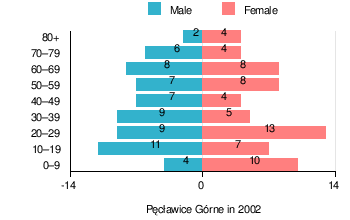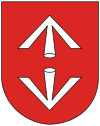Pęcławice Górne
| Pęcławice Górne | |
|---|---|
| Village | |
 Pęcławice Górne | |
| Coordinates: 50°38′44″N 21°19′38″E / 50.64556°N 21.32722°E | |
| Country |
|
| Voivodeship | Świętokrzyskie |
| County | Staszów |
| Gmina | Bogoria |
| Sołectwo | Pęcławice Górne |
| Elevation | 289.1 m (948.5 ft) |
| Population (31 December 2009 at Census)[1] | |
| • Total |
|
| Time zone | CET (UTC+1) |
| • Summer (DST) | CEST (UTC+2) |
| Postal code | 28–210 |
| Area code(s) | +48 15 |
| Car plates | TSZ |
Pęcławice Górne[2][3] [pɛnt͡swaˈvit͡sɛ ˈɡurnɛ] is a village in the administrative district of Gmina Bogoria, within Staszów County, Świętokrzyskie Voivodeship, in south-central Poland. It lies approximately 5 kilometres (3 mi) east of Bogoria, 15 km (9 mi) north-east of Staszów, and 57 km (35 mi) south-east of the regional capital Kielce.[4]
The village has a population of ![]() 108.
108.
Demography
According to the Polish census in 2002, there were 126 people residing in Pęcławice Górne village, of whom 50% were male and 50% were female. In the village, the population was spread out with 23% under the age of 18, 35.7% from 18 to 44, 19.8% from 45 to 64, and 21.4% who were 65 years of age or older.[1]
Table 1. Population level of village in 2002 – by age group[1] SPECIFICATION Measure
unitPOPULATION
(by age group in 2002)TOTAL 0–9 10–19 20–29 30–39 40–49 50–59 60–69 70–79 80 + I. TOTAL person 126 14 18 22 14 11 15 16 10 6 — of which in % 100 11.1 14.3 17.5 11.1 8.7 11.9 12.7 7.9 4.8 1. BY SEX A. Males person 63 4 11 9 9 7 7 8 6 2 — of which in % 50 3.2 8.7 7.1 7.1 5.6 5.6 6.3 4.8 1.6 B. Females person 63 10 7 13 5 4 8 8 4 4 — of which in % 50 7.9 5.6 10.3 4 3.2 6.3 6.3 3.2 3.2
Figure 1. Population pyramid of village in 2002 – by age group and sex[1]
Table 2. Population level of village in 2002 – by sex[1] SPECIFICATION Measure
unitPOPULATION
(by sex in 2002)TOTAL Males Females I. TOTAL person 126 63 63 — of which in % 100 50 50 1. BY AGE GROUP A. At pre-working age person 29 14 15 — of which in % 23 11.1 11.9 B. At working age. grand total person 70 38 32 — of which in % 55.6 30.2 25.4 a. at mobile working age person 45 24 21 — of which in % 35.7 19 16.7 b. at non-mobile working age person 25 14 11 — of which in % 19.8 11.1 8.7 C. At post-working age person 27 11 16 — of which in % 21.4 8.7 12.7
History of Pęcławice Górne
The village was previously known as Panczlawicze or Penczlawicze. It was probably founded in the 15th century in the village of ulicówki type. Then it belonged to the emblem Nicolaus Chróściel site and John Dmitrowski Pilawa coat of arms. Fiefs granges and serf castes tenth to the church parish in Szczeglice. According to the register Sandomierz collection district in 1508 with the village belonged to John de Peczlawycze Kula 1 and pay a fine and 6 cents tax. In 1578 years Pęcławice Górne belonged to the Dymitrowskiego Benedict, had a 6 sludge fife 3, 3 the peasant farm land, 4 poor bailiffs and craftsmen 2.[2] The register Sandomierz collection district in 1629 with the Latin name for years we Pęczlauice. Country then belonged to the nobleman John Podkański. In the village that lived then: 6 peasants growers for 3 fife who paid 12 florins Polish tax, 3 the peasant farm land who paid 18 cents florens 2 Polish, 1 craftsman who pay 16 cent Polish and 6 poor peasants paying 24 cent. Total village devoted 15 florins and 22 cent tax [2]. Initially, the village belonged to the district III Sandomierz after partition of Poland was rape in Austria, then in 1809 entered into the composition of the Duchy of Warsaw. Later it belonged to the Kingdom of Poland. In 1827, the village had 27 houses and 228 inhabitants.
From 1853 years had to be that the village school. This was documented by individual teachers in rural areas of the Chronicle themselves until 1939. During the January Uprising cankers battle at Pęcławice in 1863. In 1885 the farm belonged Pęcławice morgue 572 fields, including arable land and gardens were 266 morgue, meadows 16 mr., pastures 23 mr., forest 234 mr., 12 buildings and 34 wooden morgue wastelands. There is also mention that the forest is not furnished.
In 1887, the village belonged to the district Sandomierz, municipalities Górki and had 20 houses, 163 murgue fields, as well as fan.[4]
During World War I, in May 1915 this year by the city marshal Jozef Pilsudski proficiency in preparation for the battle of Konary, which lasted from 16 to 25 May 1915. In this village marshal with all staff stationed. After regaining independence, the village of Pęcławice Górne was administered in the Sandomierz, Kielce in the region. When the war started in the German planes have already circulated on 2 of the village. During the Nazi occupation of the village belonged to Generalgouvernement. Rural area and the whole area was the place of conspiracy and underground activities and national army, peasant battalions. Pęcławice top deliver in December 1944. After World War II was a village in the district Kielce. As a result of the administrative reform of 1954, a town that for 1972 years was part of the class in the district Kolonia Pęcławska Kielce. In the years 1975–1998 town administratively belonged to the Voivodeship Tarnobrzeg.
Buried in the Legion Pilsudski Pęcławice Górne
- Master Jan Kazimierz Friday nickname "Herwin."
According to one version, all initially buried in individual graves (in the so-called. Dąbki in the upper cell) on the basis of a farmer in Stanislaus Witkowski Pęcławice Górne. However, the remaining three took the family to their home towns. After a master body. Herwin Five in March 1917 reported a family from Kraków. Body carry deceased was a driver, who worked at Adalbert Zając capita rural Pęcławice Górne. Hare said Adalbert rented horse and car Staszow Jew Siejka (owner of a warehouse metallic). Jew Siejka led trade: Kraków to send agricultural and manufactured goods imported from there. Teamster Siejka pay 1 ruble per day and one ruble received from Adalbert addressed. Master body for transport. Herwin Jew agreed with the family at 800 rubles. Exhumation body of the master Dąbki. But the driver wanted more from the bottom of a Jew for such transport. As a result of the dispute came to an agreement between Jew and wagoner, and the body is not returned to the master Pęcławice Górne, but drive them to the chapel in the cemetery where he lies Szczeglice this day.[3] On 17 May 2002 revealed in the Pęcławice Górne depot fire next to a monument in honor Pilsudski legionnaires who died in this village.
- Lieutenant Brodecki – initially buried in the Pęcławice Górne. After 2 weeks after the burial was carried away by his mother, who bought a few sheets have been carded after 2 ruble each from residents of the village. Brodecki swathe mother see the body of the son in these sheets, sit in a seated position in chaise, and departed with the body in the direction of Kielce, Poland-Warsaw. When this was terminated by the words: 'My son and eat missed you'- referring to the death of a son.
- Lieutenant Kwiecinski nickname "Thistle" – the body of his mother took in July 1916, a year after his death. In order to exhume the body of his son, the mother had to get permission from the authorities in Sandomierz, which have agreed to transfer the body to Lieutenant Kwieciński provided transportation of the body in a coffin zinc. So it done. Lieutenant Kwieciński buried in Miechów.
- Sergeant Delage – his body disinter family in 2 months after his death.
- Privates – buried at the bottom headquarters in Dąbki – were exhumed in 1938.
References
- 1 2 3 4 5 "Local Data Bank (Bank Danych Lokalnych) – Layout by NTS nomenclature (Układ wg klasyfikacji NTS)". demografia.stat.gov.pl: GUS. 10 March 2011.
- 1 2 Bielec, Jan (ed.); Szwałek, Stanisława (1981). Wykaz urzędowych nazw miejscowości w Polsce. T. II: K – P [List of official names of localities in Poland, Vol. II: K – P] (in Polish). Ministry of Administration, Spatial Economy and Environmental Protection (1st ed.). Warsaw, Poland: Central Statistical Office.
- 1 2 "Pęcławice Górne, wieś, gmina Bogoria, powiat staszowski, województwo świętokrzyskie" [Pęcławice Górne, village, Bogoria Commune, Staszów County, Świętokrzyskie Province, Poland]. Topographical map prepared in 1:10,000 scale. Aerial and satellite orthophotomap (in Polish). Head Office of Geodesy and Cartography, Poland, Warsaw. 2011. geoportal.gov.pl. Retrieved 27 April 2011.
- 1 2 "Central Statistical Office (GUS) – TERYT (National Register of Territorial Land Apportionment Journal)" (in Polish). 1 June 2008.
Coordinates: 50°38′40″N 21°19′36″E / 50.64444°N 21.32667°E

